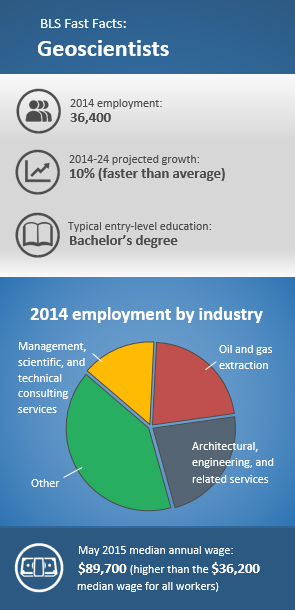All Categories
Featured
Table of Contents
What Does A Geoscientist Do? in Koondoola Aus 2023

(PREM)., and the boundaries in between layers of the mantle are consistent with stage transitions.

This makes plate tectonics possible. Schematic of Earth's magnetosphere. The solar wind flows from delegated right. If a world's electromagnetic field is strong enough, its interaction with the solar wind forms a magnetosphere. Early space probes drawn up the gross dimensions of the Earth's electromagnetic field, which extends about 10 Earth radii towards the Sun.
Inside the magnetosphere, there are relatively thick areas of solar wind particles called the Van Allen radiation belts. Geophysical measurements are typically at a particular time and location. Accurate measurements of position, along with earth contortion and gravity, are the province of geodesy. While geodesy and geophysics are separate fields, the two are so closely linked that lots of scientific companies such as the American Geophysical Union, the Canadian Geophysical Union and the International Union of Geodesy and Geophysics include both.
Geophysics Jobs in Woodvale WA 2021
, integrates astronomical coordinates and the regional gravity vector to get geodetic collaborates. This technique only offers the position in two coordinates and is more tough to use than GPS.
Gravity measurements became part of geodesy since they were required to associated measurements at the surface area of the Earth to the reference coordinate system.
Sea level can also be determined by satellites utilizing radar altimetry, contributing to a more precise geoid. In 2002, NASA introduced the Gravity Healing and Environment Experiment (GRACE), where two twin satellites map variations in Earth's gravity field by making measurements of the range in between the 2 satellites using GPS and a microwave ranging system. , which are studied through geophysics and space physics.
Geophysical Investigations in Hamersley Western Australia 2021

Since geophysics is concerned with the shape of the Earth, and by extension the mapping of functions around and in the planet, geophysical measurements include high precision GPS measurements. As soon as the geophysical measurements have been processed and inverted, the analyzed outcomes are outlined using GIS.
Many geophysics business have actually created in-house geophysics programs that pre-date Arc, GIS and Geo, Soft in order to satisfy the visualization requirements of a geophysical dataset. Expedition geophysics is used geophysics that typically uses remote noticing platforms such as; satellites, aircraft, ships, boats, rovers, drones, borehole picking up equipment, and seismic receivers.
Aeromagnetic information (aircraft gathered magnetic data) gathered using conventional fixed-wing aircraft platforms should be remedied for electromagnetic eddy currents that are produced as the airplane moves through Earth's magnetic field. There are likewise corrections connected to changes in determined possible field strength as the Earth rotates, as the Earth orbits the Sun, and as the moon orbits the Earth.
Geophysicist in East Victoria Park WA 2023
Signal processing includes the correction of time-series information for undesirable noise or mistakes presented by the measurement platform, such as aircraft vibrations in gravity information. It also includes the reduction of sources of sound, such as diurnal corrections in magnetic information. In seismic data, electro-magnetic information, and gravity data, processing continues after error corrections to consist of computational geophysics which lead to the last analysis of the geophysical information into a geological interpretation of the geophysical measurements Geophysics became a different discipline only in the 19th century, from the intersection of physical geography, geology, astronomy, meteorology, and physics.
The magnetic compass existed in China back as far as the 4th century BC. It was not up until great steel needles could be forged that compasses were used for navigation at sea; prior to that, they could not retain their magnetism long enough to be useful.
By looking at which of 8 toads had the ball, one might figure out the instructions of the earthquake. It was 1571 years before the first style for a seismoscope was published in Europe, by Jean de la Hautefeuille. It was never ever constructed. One of the publications that marked the beginning of modern science was William Gilbert's (1600 ), a report of a series of careful experiments in magnetism.
Career Guide: Geophysicist in Beeliar Aus 2022
Geochemistry, Geophysics, Geosystems. National Aeronautics and Area Administration. Recovered 13 November 2018.
Leipzig. Berlin (Gebruder Borntraeger). Runcorn, S.K, (editor-in-chief), 1967, International dictionary of geophysics:. Pergamon, Oxford, 2 volumes, 1,728 pp., 730 fig Geophysics, 1970, Encyclopaedia Britannica, Vol. 10, p. 202-202 Ross 1995, pp. 236242 Shearer, Peter M. (2009 ). Introduction to seismology (second ed.). Cambridge: Cambridge University Press. ISBN 9780521708425. Stphane, Sainson (2017 ).
Latest Posts
Geophysicist Jobs in North Perth Australia 2021
Geophysical Survey Definition in Warnbro Western Australia 2021
What Is Geophysics? in Carlisle Australia 2020